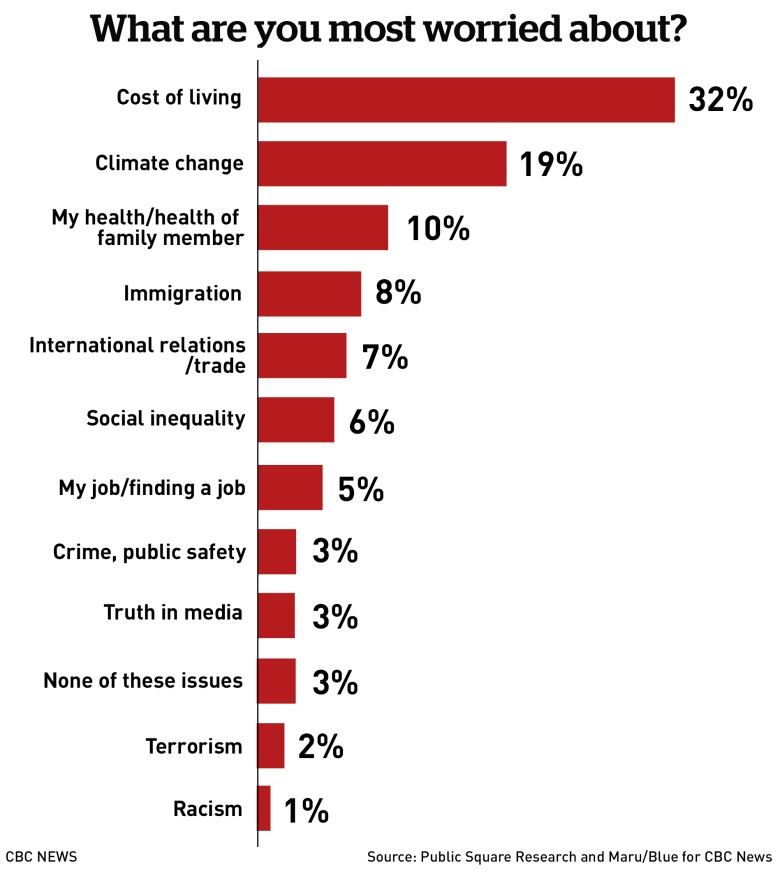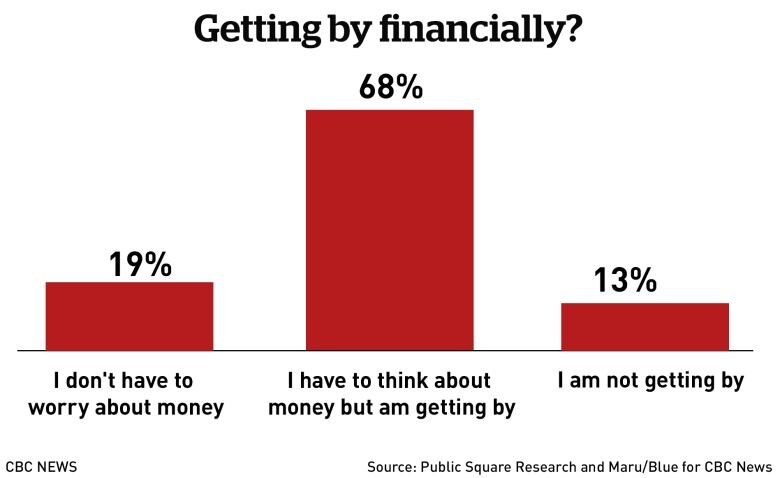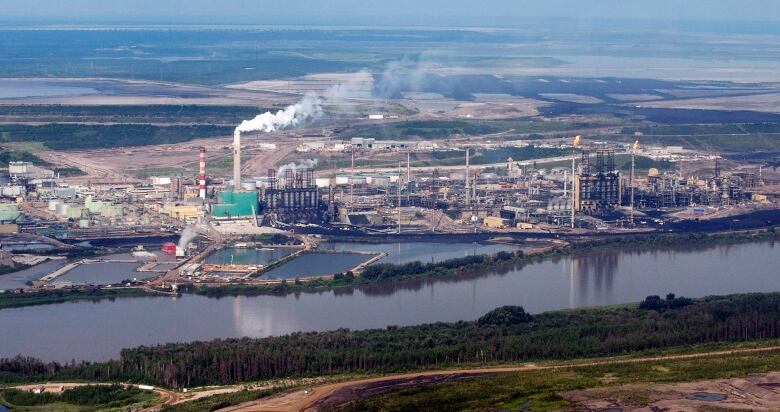Despite a strong economy, cost of living still top of mind for Canadians
An accounting of the economic data shows that perceptions don't quite match reality

This story is part of a series, called On Guard for Me: The Uneasy Canadian,digging into the results of a CBC News-commissioned online opinion poll of 4,500 Canadians ahead of the October federal election.
Nuance is a lousy talking point. It's easy enough for politicians to talk up a roaring economy. In its own way, it's easy to say what you'd do whenthe economy is in the tank. But a patchwork of mostly good and some bad is a harder pitch.
And right now, Canada's economy is doing OK. Maybe not great, but certainly not bad. That's not exactly the kind of quote that'sput on posters.
"The economy was fairly weak over the latter half of 2018," saidPedro Antunes, chief economist with the Conference Board of Canada. But, he noted, "We've seen a modest pick up in the first quarter."
On a longer scale,the last three or four years,Antunes saidthe Canadian economy has "done quite well." And while it may sometimes be hard for Canadians to see that bigger picture, economists say the country's economicindicators are relatively strong.
"The aggregate economic data in Canada is looking quite strong," saidFrances Donald, chief economist and head of macroeconomic strategy at Manulife."We have plenty of jobs, wages are rising, GDP numbers are fairly solid."
That's all the more remarkablegiven that much of the world is doing a lot worse.
And yeta new poll commissioned for CBC Newshighlights Canadians' economic anxiety, with 32 per cent of respondents saying thatthe cost of living isthe thing they are most worried about.
Watch why some Canadians say they're worried about the cost of living:
In a lot of ways, that makes sense, according to Donald.
The broader economyisperforming well,but many Canadians still struggle:Housing affordability is still at crisis levels in Toronto and Vancouver,energy prices remain stubbornly low,and child-care costs weigh heavily on families.
"So while the data,as a whole, still looks fairly solid," saidDonald,"it's completely understandable,even from someone who spends all day looking at numbers,... why consumers and households might be feeling a little bit nervous."
What's more, concern about the cost of living ranked as the top worry for every segment of Canadians polled:Indigenous Canadians, new Canadians, first-time voters and visible minorities.

While just one in 10 Canadians say they're not getting by financially, another 68 per cent say they "have to think about how they spend money." And concern over jobs ranks seventhin terms of what worries Canadians the most.
It's easy to understand where those concerns come from. Debtlevels remain high. Wages are finally beginning to rise, but growth has been stubbornly low for decades.
Still, an honest accounting of the data shows that that negative perception doesn't quite match the economic reality.
When asked to rank their top three most important election issues, a full 35 per centof Canadians polled listed"jobs/the economy." But Canada has been posting record job creation. The Canadian economy added 27,000 jobs in May, andin April, a stunning 106,500 jobs were added.In all, nearly half a million jobs were added over the past 12 months.

Wagegrowth is also coming in above inflation, meaning Canadians are seeing their wages rise faster than the cost of the things we buy, from food to gasoline.
What's more, many of the jobs being added are high-paying tech and financial services jobs.
"If you look at the period over the last decade or so, wherewe've seen this kind of restructuring away from high-paid manufacturing jobs, we've seen almost as many jobs created in this [other] segment of the economy, this professional services segment," said Antunes.

The CBC poll also found that 54 per centof respondents worrythat accepting too many immigrants would change Canadabut economists say that change is much needed,specifically on the jobs front.
"Let's just take a look at where labour markets are today," saidAntunes. "Wehave an unemployment rate that's at 5.4 per cent. According to some estimates, that's as low as it can get."
Canada, he said,is essentially at "rock bottom on the employment rate."
The Conference Board of Canada recently released a report highlighting the need for more immigration.
"There's no doubt about it that immigration will contribute to thelabour force," said Antunes."When you talk to employers in many parts of this country, [they're] desperate to find skilled and less skilled workers, and immigration is going to be a big part of solving that gap."

That kind of disconnect appears throughout perceptions aroundthe economywhether it's jobs,trade wars,exports or oil prices. Exacerbating that is the fact that Canada isn't just one singular economy, said Donald.Rather, it's a sort of a patchwork of regional and sector-based economies.
"The economy is and feels different depending on which province you're in," she said."We have the energy patch, we have urban areas that are being driven predominantly by housing activity,and then we have other key cities and rural areas that are swayed by neither of those two factors."
Economic anxiety also becomes amplified by global oil prices and international trade tensions. Canada alone doesn't have much influence in changing those.But both feed into the notion that the economy is struggling, no matter what the data says.
But if you can look past theanecdotal evidencea hard feat for everyone, no doubtyou'll find an economy performing pretty well. And in a world full of turmoil and trouble, pretty well is pretty good.













_(720p).jpg)


 OFFICIAL HD MUSIC VIDEO.jpg)
.jpg)



























































































